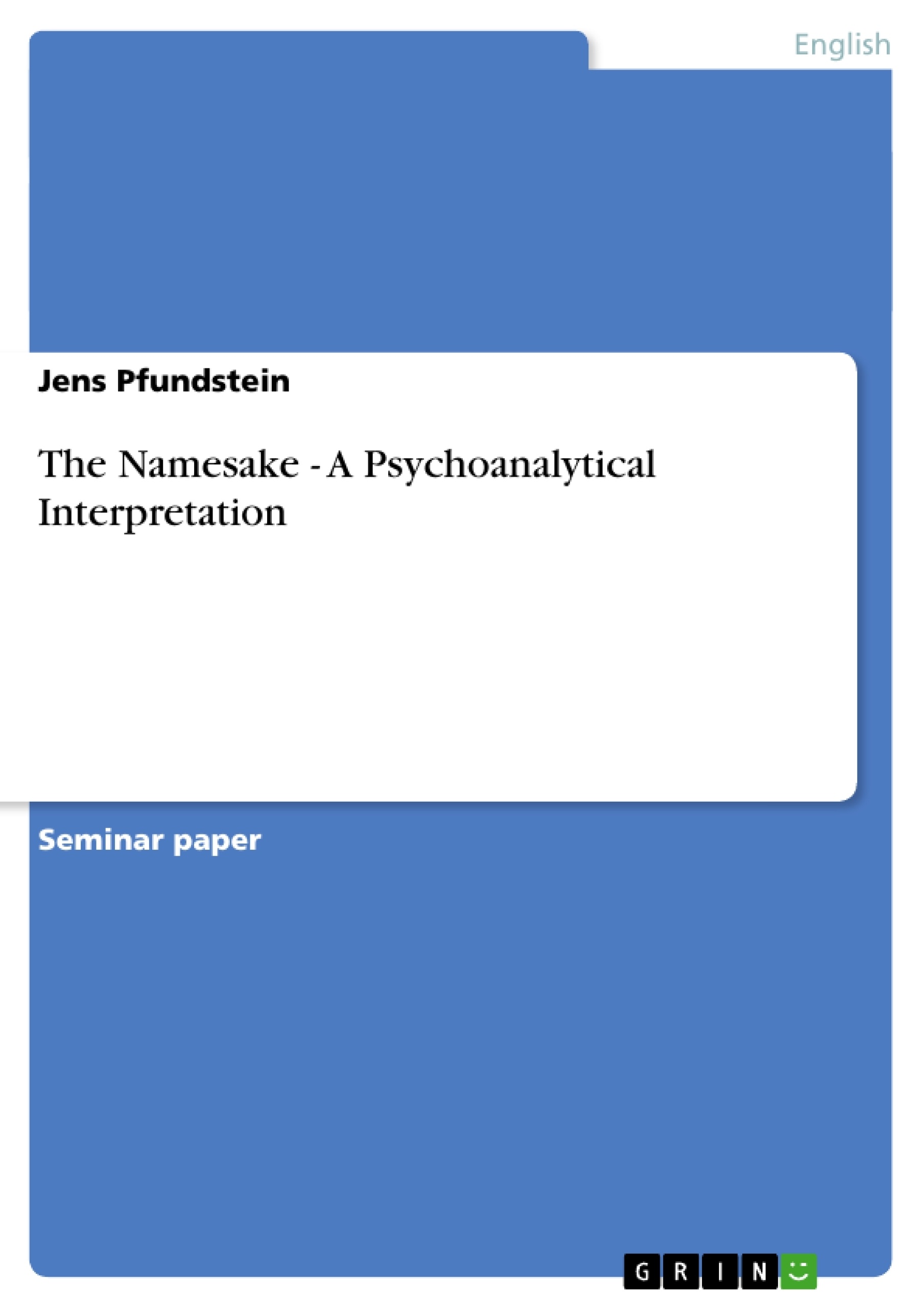In this paper, we will attempt a psychoanalytically tinted interpretation of one, if not the main character in Jhumpa Lahiri’s The Namesake. To be more specific, we intend to concentrate on Gogol Ganguli.
As the novel is said to portray "… conflicts that … haunt Gogol on his own winding path through divided loyalties, comic detours, and wrenching love affairs" (Lahiri reverse of the novel), we should thus be allowed to ask what conflicts ? Is it true that there are several conflicts or is it possible that there exists only one major conflict ?
With these questions in mind and the feeling that there is something in the text we are not explicitly told, we decided to try a psychoanalytical interpretation of Gogol – an interpretation which allows us to approach the text as follows:
We will first provide the definitions of the basic concepts and ideas. As these concepts and ideas are not only abstract, but contradictory to a certain degree, we feel obliged to simplify and generalize these notions – without falsifying or distorting the basic concepts.
Secondly, we will provide the reader with our line of argument. In other words, we will piece together the basic notions in order to form a coherent line of thought.
The third step consists of an application of this line of thought to the text, which, in turn, is expected to yield new insights.
As we are convinced that this approach provides new insights, we will deal with their implications in step four. This then brings us to the conclusion of the paper, which will take the form of a short summary of all our findings.
Inhaltsverzeichnis (Table of Contents)
- Introduction
- The Basic Concepts
- The Dyad and the Dyadic Relationship
- Object and Object Relation
- The Triad and the Triadic Relationship
- The Oedipal Triangle
- The Oedipus Complex
- Castration Anxiety
- Imago
- Repression
- The Line of Thought
- Interpretation of The Namesake
- Implications
- Gogol
- Gogol and Ashoke
- Gogol and Ashima
Zielsetzung und Themenschwerpunkte (Objectives and Key Themes)
This paper aims to offer a psychoanalytic interpretation of Gogol Ganguli, a main character in Jhumpa Lahiri's The Namesake. The analysis will explore potential underlying conflicts within the character, moving beyond explicit narrative details. The approach involves defining key psychoanalytic concepts, constructing a coherent line of argument based on these concepts, applying this argument to the text, and finally, examining the implications of the resulting insights.
- Psychoanalytic interpretation of character motivations
- Exploration of internal conflicts and divided loyalties
- Analysis of character relationships and their impact
- Application of psychoanalytic theory to literary analysis
- Uncovering implicit conflicts and themes within the narrative
Zusammenfassung der Kapitel (Chapter Summaries)
The introduction lays out the paper's objective: a psychoanalytic interpretation of Gogol Ganguli in Jhumpa Lahiri's The Namesake, focusing on potential underlying conflicts. The section on "Basic Concepts" defines key psychoanalytic terms such as the Oedipus complex, repression, and the dyadic relationship, providing a theoretical foundation for the analysis. The "Line of Thought" section outlines the argumentative structure of the paper. The chapter on the interpretation of The Namesake applies the established psychoanalytic framework to the novel's narrative. The "Implications" section will delve into the insights gained from this analysis, exploring its ramifications for understanding the character and the novel itself.
Schlüsselwörter (Keywords)
Key terms and concepts explored in this paper include: psychoanalytic interpretation, The Namesake, Gogol Ganguli, Oedipus complex, repression, dyadic relationship, internal conflict, divided loyalties, character relationships, literary analysis.
Frequently Asked Questions
What is the focus of the psychoanalytical interpretation of "The Namesake"?
The analysis concentrates on the character Gogol Ganguli and the underlying psychological conflicts that haunt him on his path through divided loyalties.
Which psychoanalytic concepts are applied to Gogol?
Key concepts include the Oedipus complex, castration anxiety, repression, and the dynamics of dyadic and triadic relationships.
How does Gogol's relationship with his parents fit into this theory?
The paper examines his ties to Ashoke and Ashima through the lens of object relations and the "Oedipal triangle," looking for implicit conflicts.
What are "divided loyalties" in Gogol's context?
They refer to the internal struggle between his Bengali heritage (represented by his family) and his American identity, often manifested in his feelings about his name.
What is the goal of using repression as a concept in this analysis?
It helps uncover feelings or desires that are not explicitly stated in the text but influence Gogol's "comic detours" and "wrenching love affairs."
- Quote paper
- Jens Pfundstein (Author), 2008, The Namesake - A Psychoanalytical Interpretation, Munich, GRIN Verlag, https://www.hausarbeiten.de/document/120039


